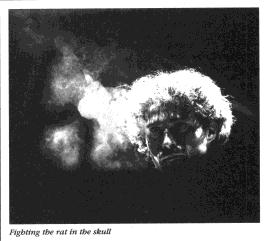 Rat in the Skull
Rat in the Skullby Ron Hutchinson
Reviews, Socialist Review, No. 191, November 1995, p. 29.
Copyright © Socialist Review.
Copied with thanks from the Socialist Review Archive at http://www.lpi.org.uk.
Marked up by Einde O’Callaghan for the Marxists’ Internet Archive.
 Rat in the Skull
Rat in the Skull
by Ron Hutchinson
A young Irishman describes from his prison cell how the police have kicked his door in, put the boot into him, dragged him across the room and held him in Paddington Green police station under the Prevention of Terrorism Act, taking turns to interrogate him hour after hour until he confesses. The British police are shown to be cynical, after convictions at any cost, and the Belfast Royal Ulster Constabulary to be brutal and bigoted.
A play that begins like that and holds the audience engrossed for two hours without a break should get praise from any socialist reviewer. But I could not help feeling a little uneasy at Rat in the Skull, revived 11 years after its first run at the Royal Court.
The power of the play comes from the juxtaposing of the monologue by the prisoner with another near monologue by the RUC officer trying to interrogate him. Each gives expression to views which go unchallenged among the people that they come from. The prisoner talks about police harassment, oppression and the fight for nationhood. The RUC officer rants on about Catholics trying to outbreed Protestants and living on social security from a state they reject.
My doubts about the play began when I realised both sets of views were treated as equally valid (or invalid), with the Orange view being more forcefully put – perhaps because it was put by a more forceful actor (Tony Doyle, who played the crooked police chief in the television series Between the Lines). The doubts increased when at least some of the audience laughed with the RUC man when he cracked his anti-Catholic jokes, rather than against him. The play’s message is that it is the two opposed sets of beliefs that have set Republicans and Loyalists needlessly at each others throats.
Isn’t it like ‘two fellas in a ditch, clubbing each other till the one dropped dead?’, the RUC man asks the prisoner as he makes fun of his beliefs. ‘You can’t afford letting the rat get in the skull, telling you you’re wrong, the fight’s not worth the fight.’
But, there’s a rat in the RUC man’s skull as well. He half knows the Loyalist cause is a doomed one. ‘We’re going to be sold down the Swanee one of these fine days. Or should I say the Shannon?’ And the British regard him as much an Irishman as the prisoner. ‘I resent what a quarrel between two brands of Irishman has done to my town, my life,’ complains the Scotland Yard officer.
If only, it seems, both Nationalists and Loyalists could shake their brains free of preconceptions, then the whole conflict in Northern Ireland would come to a conclusion. As it is, they are like twin tribes, each hating and needing the other, condemned to fight on for ever – especially if the British ever withdraw.
This can be an appealing message to a British audience, but it’s by no means the whole truth about Ireland. Orangeism and Republicanism have never been completely symmetrical, and the British forces have never simply held the ring between the two.
Orange myths were carefully cultivated in the past exclusively among Protestants to provide a cloak for oppression and exploitation – indeed, the Orange Order was founded exactly 200 years ago to mobilise opposition to a Protestant led anti-British movement, the United Irishmen.
By contrast, Republican myths arose out of a confused battle against oppression, and even if that tended to be based mainly on Catholics it also always included some individual Protestants. That is why more is needed in Northern Ireland today than for ‘the two communities’ simply to tolerate ‘the identity’ of the other.
The play is well worth seeing, despite these reservations. If it provides a caricatured view of Republicanism, it also explores well many of the contradictions of Loyalism. And it is highly enjoyable.
Rat in the Skull plays at the Duke of York’s Theatre, London
Last updated on 3 November 2019